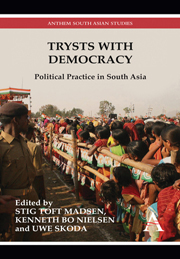Book contents
- Frontmatter
- Contents
- List of Tables
- List of Abbreviations
- Glossary
- Map of South Asia
- Acknowledgements
- 1 Introduction
- Part One Theoretical Issues
- Part Two India
- Part Three Beyond India
- 8 Nepal: Governance and Democracy in a Frail State
- 9 Entanglements of Politics and Education in Sri Lanka
- 10 Shifting between the Local and Transnational: Space, Power and Politics in War-torn Sri Lanka
- 11 Domestic Roots of Indian Foreign Policy
- 12 When Democracy is Not the Only Game in Town: Sectarian Conflicts in Pakistan
- About the Editors
- About the Contributors
10 - Shifting between the Local and Transnational: Space, Power and Politics in War-torn Sri Lanka
from Part Three - Beyond India
Published online by Cambridge University Press: 05 March 2012
- Frontmatter
- Contents
- List of Tables
- List of Abbreviations
- Glossary
- Map of South Asia
- Acknowledgements
- 1 Introduction
- Part One Theoretical Issues
- Part Two India
- Part Three Beyond India
- 8 Nepal: Governance and Democracy in a Frail State
- 9 Entanglements of Politics and Education in Sri Lanka
- 10 Shifting between the Local and Transnational: Space, Power and Politics in War-torn Sri Lanka
- 11 Domestic Roots of Indian Foreign Policy
- 12 When Democracy is Not the Only Game in Town: Sectarian Conflicts in Pakistan
- About the Editors
- About the Contributors
Summary
Introduction
Excel Exhibition Centre, Docklands, London, 27 November 2009. It is Maaveerar Naal, or ‘Heroes Day’, the day of remembrance for Tamils killed in the civil war between the Liberation Tigers of Tamil Eelam (LTTE) and the Government. The war had come to a bloody end just months earlier when Sri Lankan government forces captured the last LTTEcontrolled areas in northern Sri Lanka. Heroes Day has been organised by LTTE in Sri Lanka since 1989 and more recently the day has been marked every year in many parts of the world among the Tamil diaspora. The 2009 Heroes Day was the first since the LTTE was defeated in Sri Lanka. As in previous years, the event in London was attended by tens of thousands of Tamils. On stage there were performances portraying the final days of the war when the leadership of the LTTE was killed and civilians suffered in the crossfire of the fighting and later in closed camps in the area known as Manik Farm. In between the performances, politicians and activists, Sri Lankan Tamil, Indian Tamil and British, addressed the audience about the continued aspiration for an independent homeland or Tamil Eelam, and about the role of the diaspora in achieving this aim.
War and displacement create specific connections between local and global processes. In this chapter, we explore such connections by way of analysing the politics of representation and identity among Tamils in Sri Lanka and in the Tamil diaspora.
- Type
- Chapter
- Information
- Trysts with DemocracyPolitical Practice in South Asia, pp. 239 - 260Publisher: Anthem PressPrint publication year: 2011
- 3
- Cited by



